In early May 2023, Hollywood grinded to a halt as the Writers Guild of America announced they would be going on strike.
Just under two months later, the Screen Actors Guild announced that they would also cease working, with both parties failing to reach an agreement with the Alliance of Motion Picture and Television Producers.
As many beloved programmes go dark, we explore the background of the 2023 writers and actors strike, what it means, and how it will impact film and television across the globe.
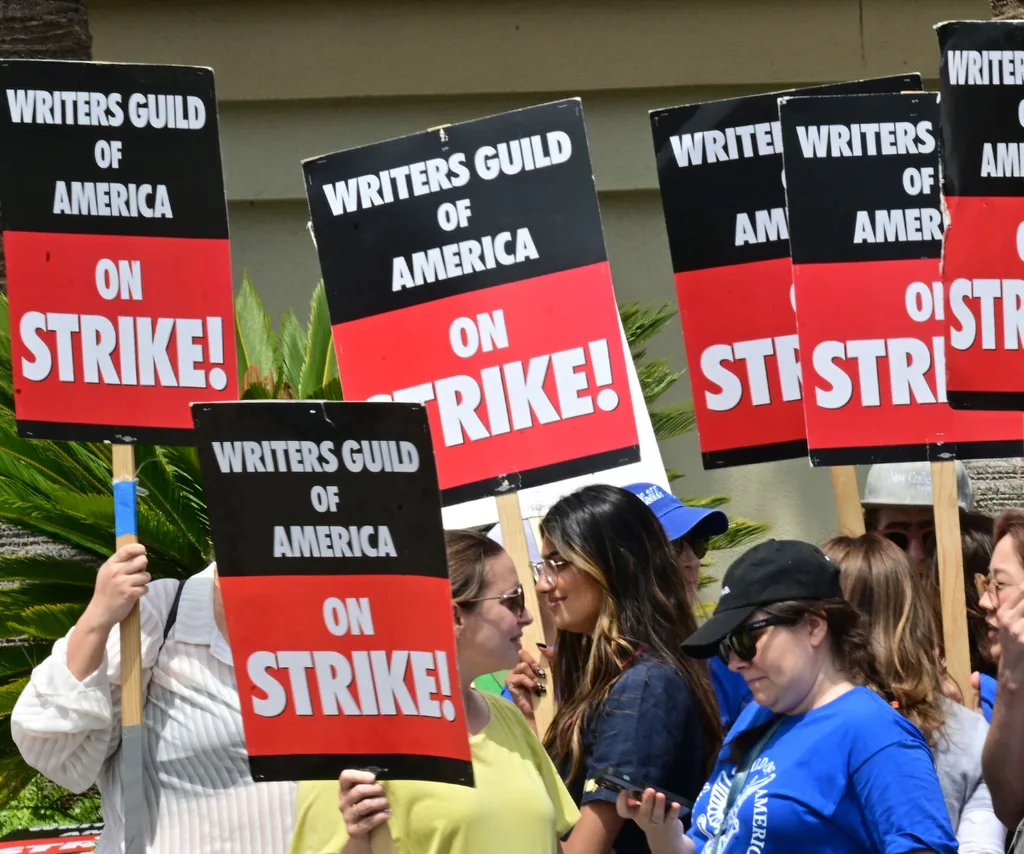
The WGA were the first of the two unions to go on strike.
(Image: Getty)Who is involved in the writers strike?
There are three primary parties involved in the writers strike; Writers Guild of America (WGA), Screen Actors Guild and American Federation of Television and Radio Artists (SAG-AFTRA), and Alliance of Motion Picture and Television Producers (AMPTP.)
The WGA is divided into two groups, WGA East and WGA West, with both representing the east and west of the United States.
The WGA represents an estimated 25,000 members, covering writers in news, radio, film, television, and online media.
SAG-AFTRA represents over 160,000 members globally. SAG-AFTRA previously went on strike for 340 days in late 2016 to protest for greater safety, transparency, and remuneration for video-game voice actors. The 2023 strike is the first time both SAG-AFTRA and WGA have been on a joint strike since 1960.
AMPTP represents over 350 American film and television production companies during their regular contract negotiations with industry unions, such as WGA and SAG-AFTRA. Some notable AMPTP members include Netflix, Amazon, Walt Disney Studios, Paramount Pictures, and Universal Pictures.
When did the writers strike start?
The writers start officially commenced at 12:01a.m. on May 2, 2023 following the WGA and AMPTP being unable to finalise their negotiations by their May 1, 2023 contract expiry date.
The strike was previously authorised on April 18, 2023, with 97.85 percent of the WGA’s members voting in favour of a strike if they were unable to reach a satisfactory agreement with AMPTP.
SAG-AFTRA commenced their strike on July 14, 2023 after failing to reach a satisfactory negotiation with AMPTP. The impact of the strike was immediately visible, with the cast of Christopher Nolan’s Oppenheimer walking out of the film’s London premiere in support of the strike.
“We have to acknowledge [the actors absence]. You’ve seen them here earlier on the red carpet. Unfortunately, they’re off to write their picket signs for what we believe to be an imminent strike by SAG,” Nolan told the audience.
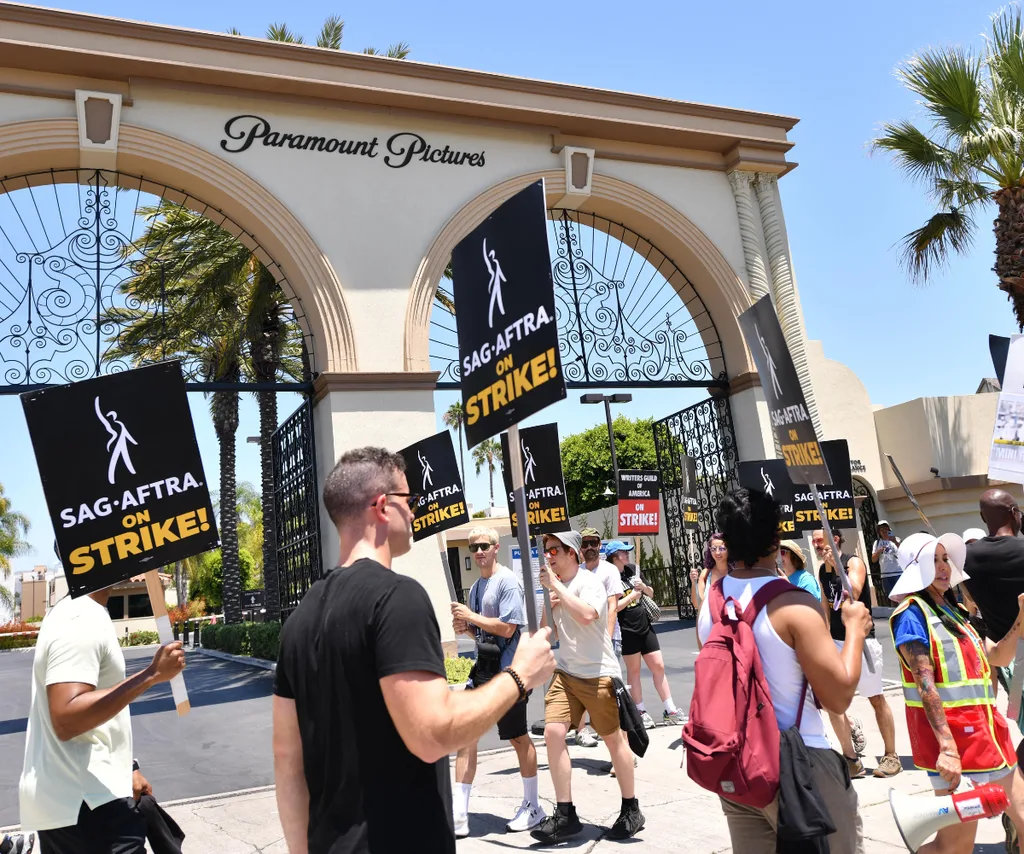
SAG-AFTRA members began their strike on July 14, 2023.
(Image: Getty)Why are the writers and actors striking?
The WGA and SAG-AFTRA are striking due to AMPTP failing to meet their requests for their renewed contract.
One of the primary areas of concern is residual payments to writers and actors in the era of online streaming.
Residuals function similarly to royalties, with writers and actors being paid a percentage of the profits from advertising revenue. Writers and actors involved in a production are then given a residual payment each time the television show or film they worked on is broadcast or shown.
While the traditional advertising model remains prevalent in traditional television and cinema, the increase in popularity and usership on streaming platforms has seen a revenue shift away from advertising, with companies now generating the majority of their revenue from user subscriptions.
This is an area of concern for those striking as their contracts primarily account for revenue from television re-runs and do not account for the popularity of streaming-based programmes.
Abbott Elementary writer Brittani Nichols told More Perfect Union “the amount for a re-air on the [traditional television] network is $13,500 and the amount that you’re paid for that episode being on streaming is $700.”
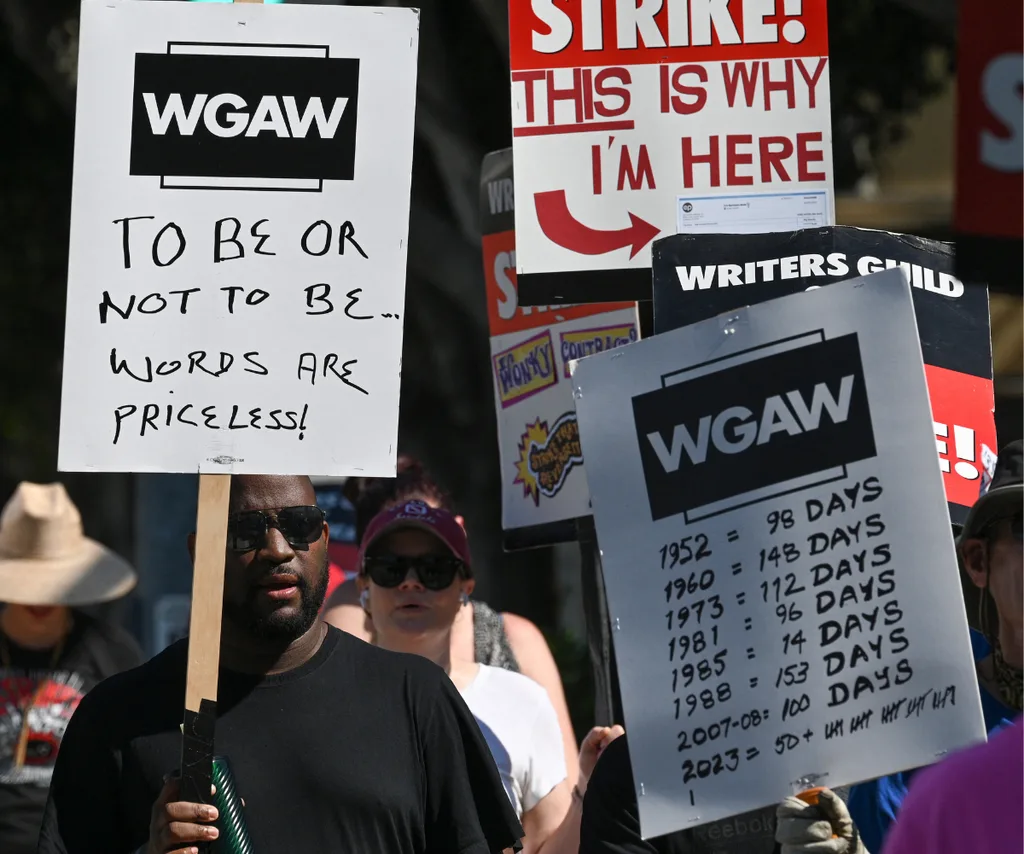
Both WGA and SAG-AFTRA are pushing for fair pay for their members.
(Image: Getty)The WGA are also calling for revisions to the number of writers involved in a writing room, with some streaming episodes employing only two or three writers per episode in comparison to the typical seven to ten.
The WGA argue that this ‘mini room’ model limits the career progression of writers due to job scarcity, poor pay, lack of mentorship, and poor job security.
SAG-AFTRA are also campaigning for greater financial security, with actors receiving incredibly small residual payments for their work on streaming services.
Actress Mandy Moore, who starred in the Emmy Award-winning series This is Us told the Hollywood Reporter that her residual payments for the show were “very tiny, like 81 cent cheques,” adding “I was talking with my business manager who said he’s received a residual for a penny and two pennies.”
Both the WGA and SAG-AFTRA are also concerned about the lack of regulation of artificial intelligence, with writers fearing that scripts may soon become AI-generated and actors growing concerned about the use of AI to map actos faces to digitally generate their performances.
How long will the writers strike go for?
It is unknown just how long the writers strike will continue for.
During the 2007-2008 writers strike, all 12,000 members of the WGA ceased working from November 5, 2007 to February 12, 2008.
The WGA also striked between March and August of 1988, with the 153-day strike remaining the longest strike period in the WGA’s history.
Speaking on the strike period, SAG-AFTRA President and The Nanny star Fran Drescher told the press, “right now, we discussed what it would cost if it went for six months, so we’re looking for the long haul.”
“The gravity of a commitment like this is not lost on any of us. It’s major, but we also see that we have no future and no livelihood unless we take this action, unfortunately.”
If the 2023 strike lasts for the same timeframe as the 2007-2008 strike, the writers will be out of work until August 9, 2023.
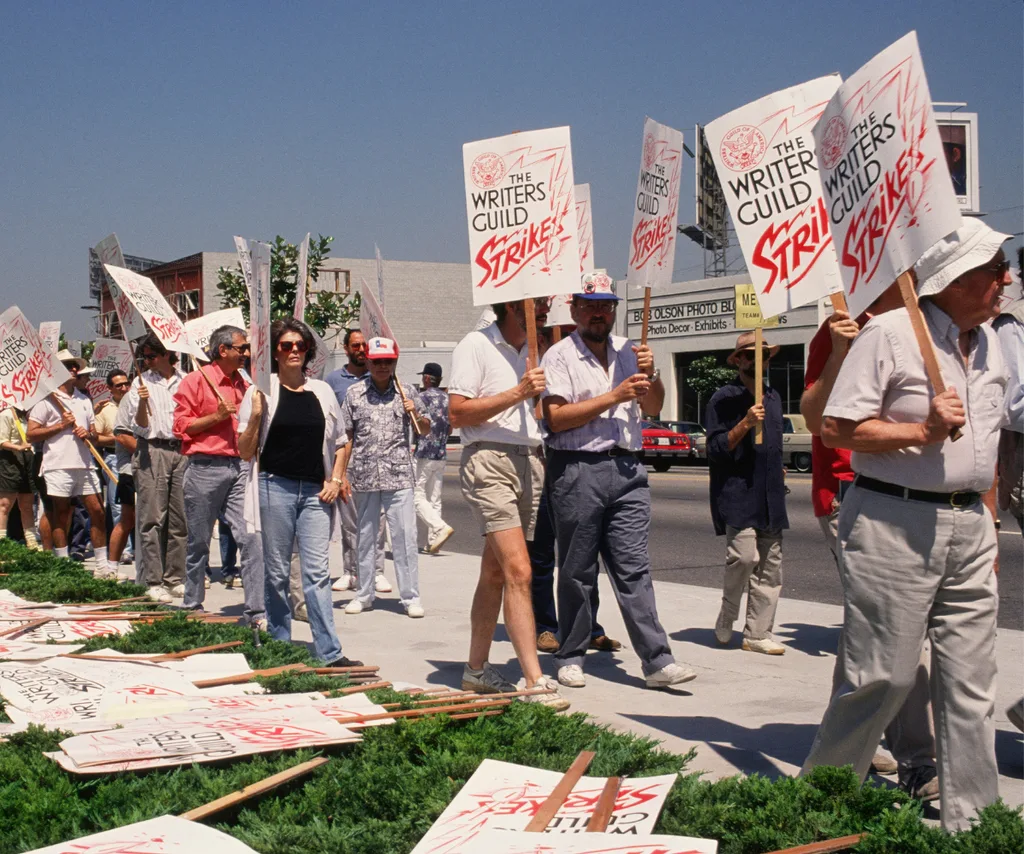
WGA members form a picket line along Los Angeles’ Beverly Blvd in 1988.
(Image: Getty)What shows have been impacted by the writers strike?
As a result of the ongoing strike, production has halted on a large number of popular television shows and films.
According to TV Insider, some high-profile productions that have been delayed indefinitely include;
1923 S2
Abbott Elementary S3
American Horror Story S12
Andor S2
Blade Runner 2099
Emily in Paris S4
Euphoria S3
House of the Dragon S2
Jeopardy! S39
Outlander S8
Saturday Night Live S48
Stranger Things S5
The Handmaid’s Tale S6
The Last of Us S2
The Mandalorian S4
Yellowjackets S3
Late-Night talk shows have also already come to a complete stop, with Jimmy Fallon, Stephen Colbert, Jimmy Kimmel, Seth Meyers, Bill Maher, John Oliver, and Trevor Noah’s programmes now only airing re-runs.
Many of Hollywood’s glamorous award shows have also been postponed indefinitely as a result of the ongoing strike, including celebrations such as the Emmy Awards, MTV Movie & TV Awards, and the Tony Awards.
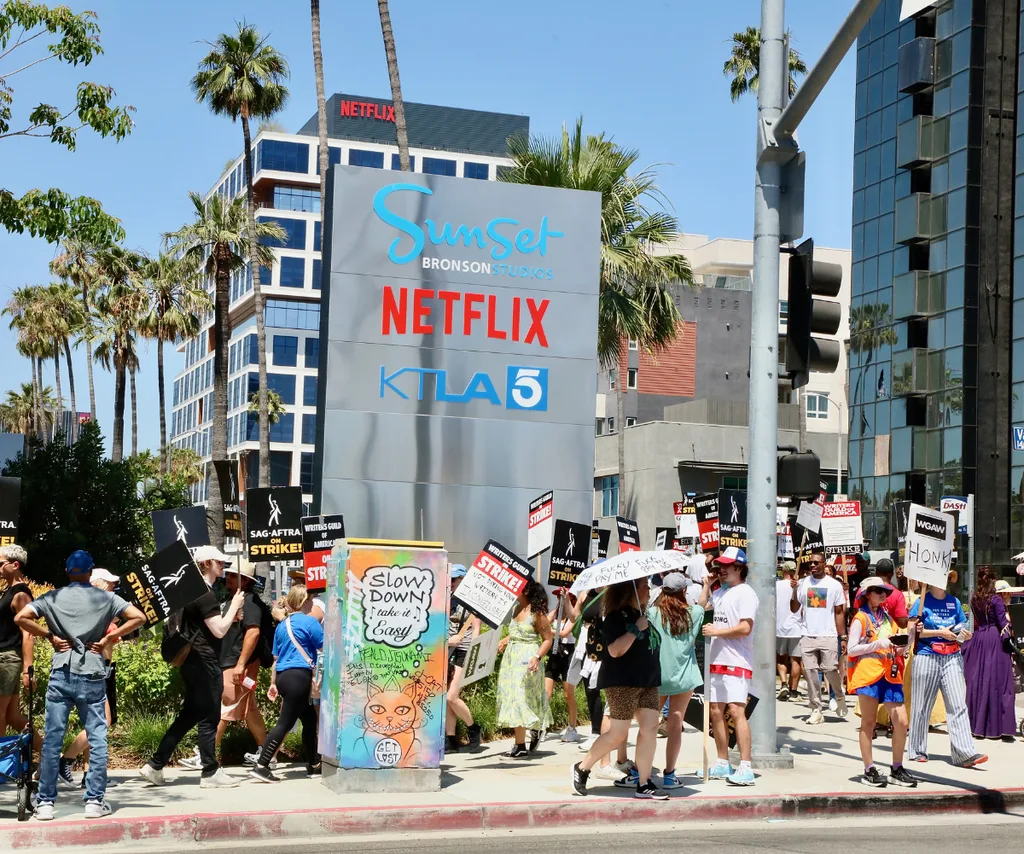
SAG-AFTRA and WGA members are continuing to protest outside AMPTP member headquarters.
(Image: Getty)Does the writers strike impact Australia?
Although we are a long way from Hollywood, Australians working in the film and television industry will be somewhat impacted by the strike.
According to the Australian Financial Review, multiple U.S. productions slated to film in Australia have been halted indefinitely, with local and international cast and crew now receiving no income.
Mortal Kombat 2 and U.S. streaming service Peacock’s Apples Never Fall have paused on production in Queensland; impacting over 820 local jobs. Production on Apple TV’s $180 million series Metropolis was scheduled to commence in Victoria and employ over 4000 workers however, the series was cancelled during pre-production as a result of unfinished scripts due to the strike.
For Australians still working in film and television, there is still a level of hope, with Screen Producers Australia (SPA) issuing a statement that confirmed “the strike does not apply to non-scripted productions, including documentaries, light entertainment, and reality shows.”
“[The strike] will apply to some scripted TV and feature films produced in Australia,” SPA continued, adding that they anticipate that the strike will impact “a limited number of scripted ‘off-shore’ (ie. non-Australian) productions … with cast and crew stood down while the strike continues.”










